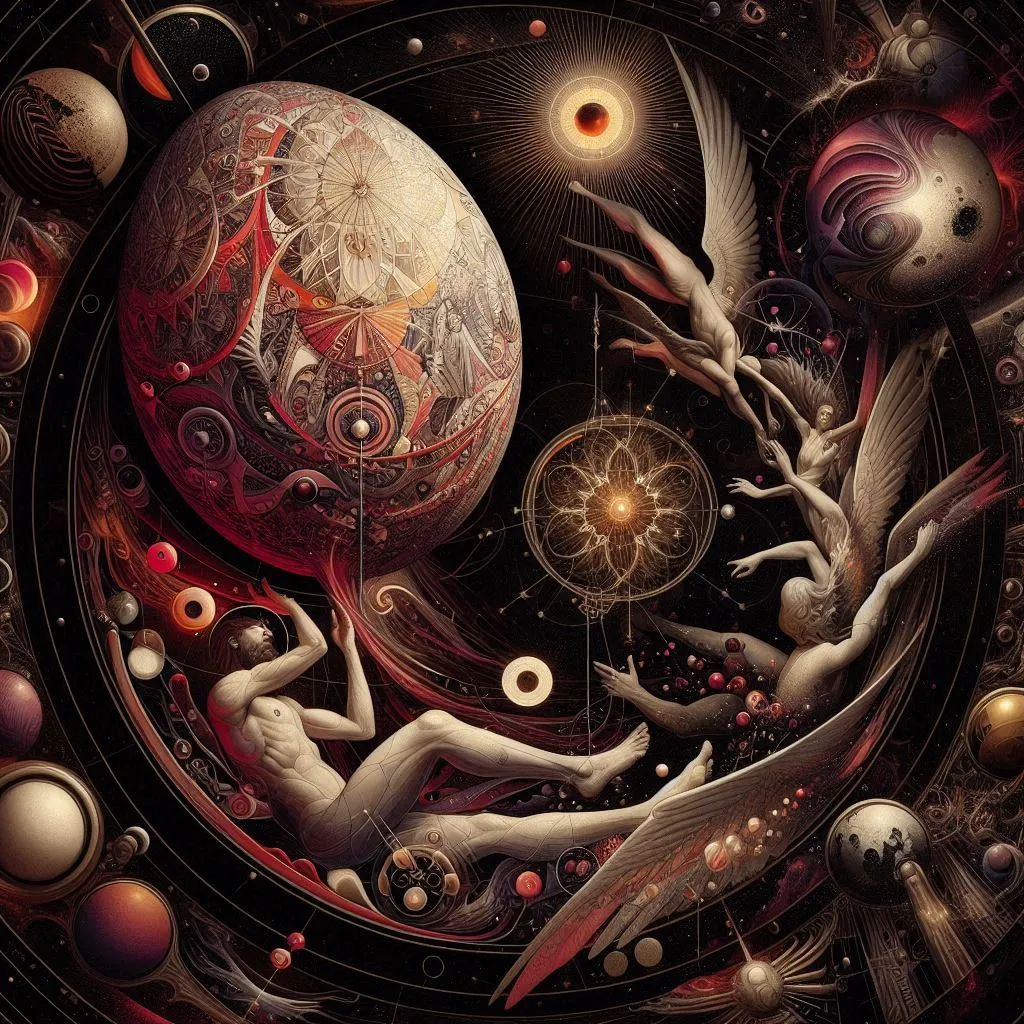
Everything is dall-e3, don't worry.
Known also as a Religion, and hosted as a Rite in Ancient Greece, one of the most interesting subjects contains some Allegories, as expected...
Orpheus, one of the firsts figures mentioned by Apollonius in the Opus "Argonautica" (based on Hesiod's "Theogony"), is able to enchant animate and inanimate objects with his Music and Lyre, a small harpe, like peoples, animals, stones, plants or trees... (Is he Tom Bombadil?).
Linked to Pythagorianism, the Orphic literature is also about the Eleusynian/Dyonisian mysteries, "the most famous of the secrets religious rites of ancient Greece". Initiations made every year for the cult of Demeter and Persephone.
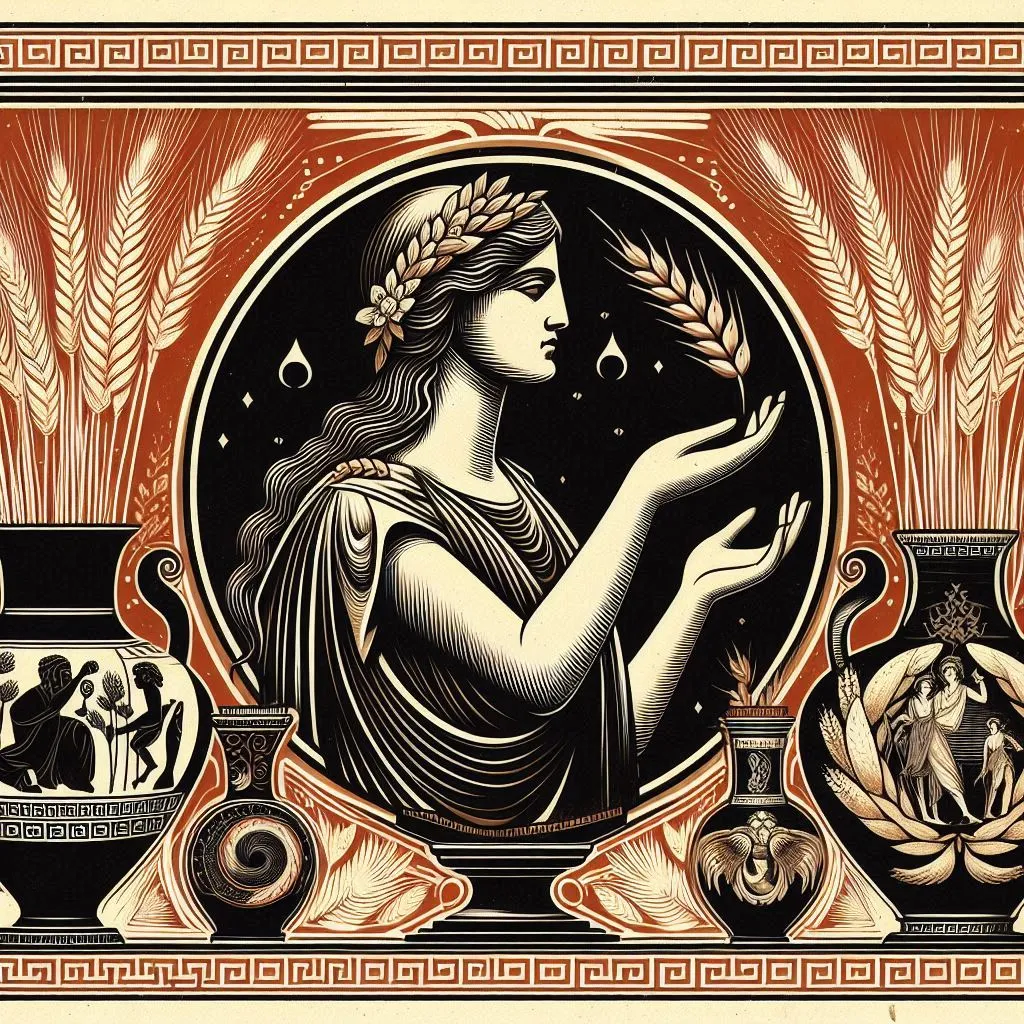
For recall, Demeter, daughter of Chronos, is an Agriculture and Harvest Goddess, also mentioned for Fertility, beyond Crops and Grains. While Persephone, Hades's wife, daughter of Demeter, became goddess of Underworld, Spring and Vegetation.
The story goes about the abduction of Persephone by Hades. "A cycle with three phases: the Descent (loss), the Search, and the Ascent". (Taking from Eleusynian page on wikipedia).
I Read a compendium book once about almost all main Greek Mythology tales and Demeter searching her daughter everywhere for a long time without success is kinda impacting.
After knowing of her abduction, Demeter neglected her Goddess duties, causing the Earth to become barren, unable to grow food, and Humans dying of famine.
Zeus ordered her return from Hades, but Persephone ate food from underworld and now had to divide the year between staying with each of them.
This Metaphor over Cultive and Harvest is tied directly by Weather Cycles of Seasons, consequently Sowing and Generation, by so why Persephone became Goddess of Spring. An interplay between Life, Death and Re-birth.
Curiously, Hipparchus, a Greek Genius Astronomer, in the 2nd century BCE, is credited as who discovered the Precession of the Equinoxes, using basis from others Astronomers like Thales, Anaximander, Pythagoras, Eudoxus, Aristotle. That so on also used Mesopotamian data, like the MUL.APIN tablet, done with naked eyes observation. They were Rationalists, its common to see Pseudoepigraphies attributed to these folks to make it look cool.
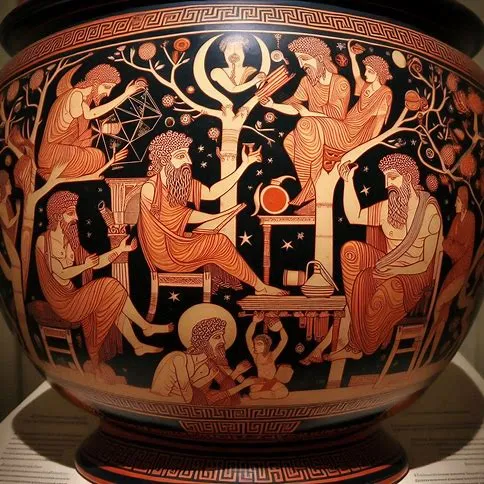
Orpheus, in similar situation, having his wife, Eurydice, dying shortly after their wedding, goes to Hades and Persephone to retrieve her. He charms everyone with his Music, convincing them to allow the return.
However there is a condition to follow, he cannot look back at her until they've both exited the underworld. He tragically loses by looking back too soon, and she is pulled back permanently. A very known Myth but that I didn't read yet...
(Not totally grasping the meaning of this irreversible Loss and Separation, it sounds related to idea of losing the Harvest).
Following reality...
The Rite is mentioned as surrounded by "Ecstasy", where together with Dance and Music, mixed substances subjected to Fermentation could be used, maybe figuratively, like Cheese, Barley and Wine, that could also reffer to Psychodelic Drugs, like a Trance State.
Ecstasy, Etymologically meant by Greeks as one who is totally Submersed in the Object of its Awareness, the removal of Mind from its Normal Function. In this case, a Heightened State of Consciousness. A term that brings me much Joy lol.
Some things can only be understood by Silence and Contemplation/Worship of the creation. By that maybe can you receive some Divine Logos? For now I'm just acting as a Hierophant to have some fun (Maybe 'll write about Zoroastrianism next time?).
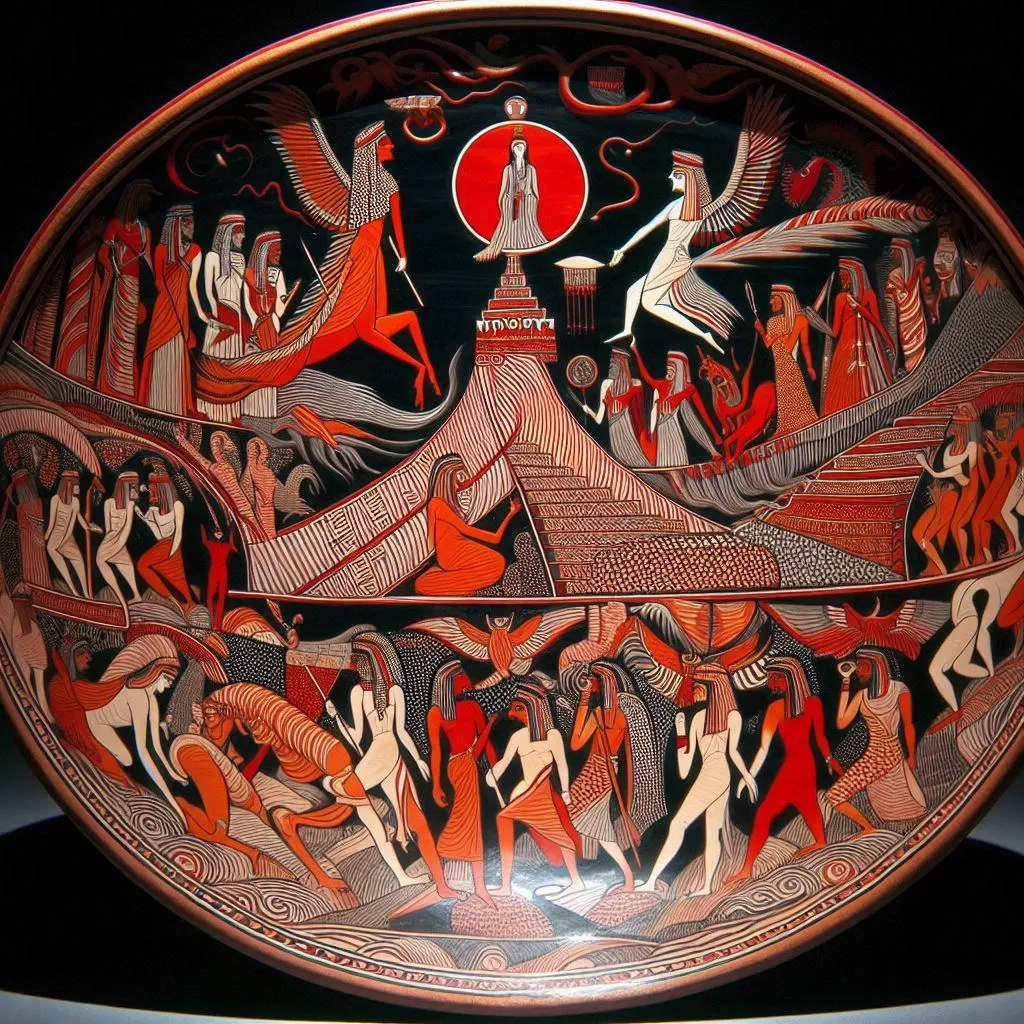
Now, a much similar Older Text, a Sumerian Tale, The Descent of Inanna (or Ishtar)...
Inanna, the most quoted character in Ancient Mythology, goes to Kur (underworld) to attend the rites funeral of Gugalanna, the Bull of Heaven sent in revenge to fight and killed by Gilgamesh, who refused to be seduced and become Inanna's consort, as told in the known Epic.
There, Inanna has to pass through 7 gates, each with a "Judge" guardian doorkeeper, whereas on each she gets removed an adornament e even the garment, considered a perfect way of the underworld that shouldn't be questioned.
Entering in majesty through the 1st gate and arriving at the throne room naked and bowed low to face Erishkigal and Nergal, she is still judged guilt, perishing and nailed in a wall for some days.
(My take is that its somewhere she can carry nothing that she owns, only what she is, and nah, this isn't "The Divine Comedy" of Dante).
Some different aspects from the Akkadian myth and the Sumerian, where, respectivelly, Nergal is quoted as Erishkigal husband in one, and Gugalanna in the other.
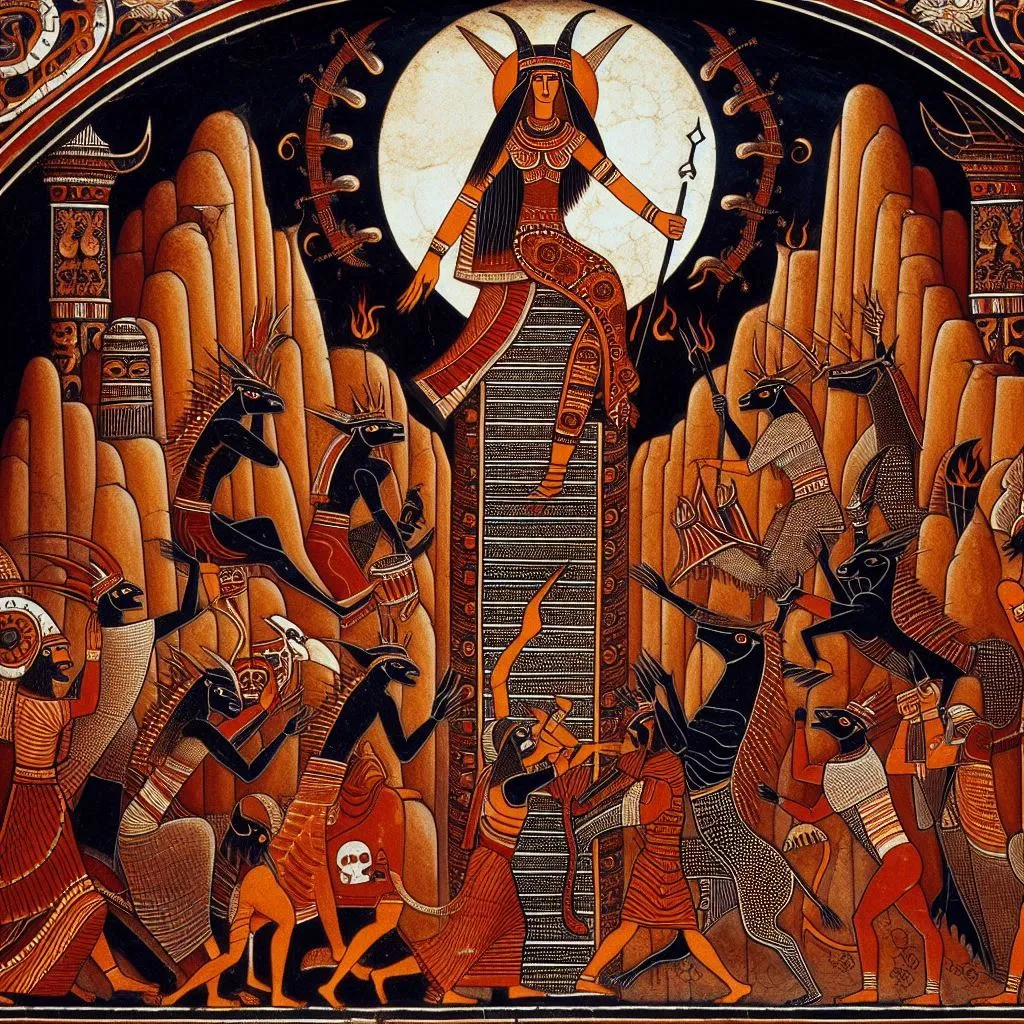
Ninshubur, her attendant, is talked before the descent in case of no return to pledge salvation to the Gods. So she visits Enlil and Nanna, that denies it, except Enki, who intervens by sending 2 Sexless Beings to restore her life (Angels?).
However, she is Demanded to leave someone in exchange of returning. Going back acompanied by Guardians to pick someone, she chooses her husband, Dumuzid, a Shepard, Plant Growth, and Spring Deity (another early King of Uruk), that wasn't mourning for her Death. Showing again a Link and dissociation between Fertility and Vegetation.
Eventually, Dumuzid, transforming itself into a Snake to escape, is granted to go back to Heaven (Ekur) for half year through a spot exchange with his sister, Geshtinanna, representing the same Seasonal Cycles. She, weirdly, is attributed as a Scriber of the Dead, and Dream Interpreter.
You wonder, why so much coincidence? All this story was also hosted as a holiday Agricultural Cult festival in Mesopotamia, transmited from Sumerians to Babylonian, then carried to Greece, as many other things...
This happens because Babylon was invaded and taken many times, by Assyria e.g., Persia, Macedonia (Ptolemaic dynasty), Roman empire by César, where their main library was destroyed, until turning into this influenced Western Greco-Roman culture.
Somehow this also resembled Joseph story, Son of Jacob, Son of Isaac, Son of Abraham. That after sold by his Brothers and going to Egypt, refused to partner with his boss's wife, was unjustly imprisioned, then released by the Pharaoh for interpreting dreams of famine, resolving it by stocking food, although with no mentions to the underworld part, and beyond some more interesting linked Apocryphal Judaic Texts... (But honestly, if the Old Testament is a compilation of Parables of Ancient Egypt and Middle East, its Weird that they don't tell their Canon tales).
What else?!
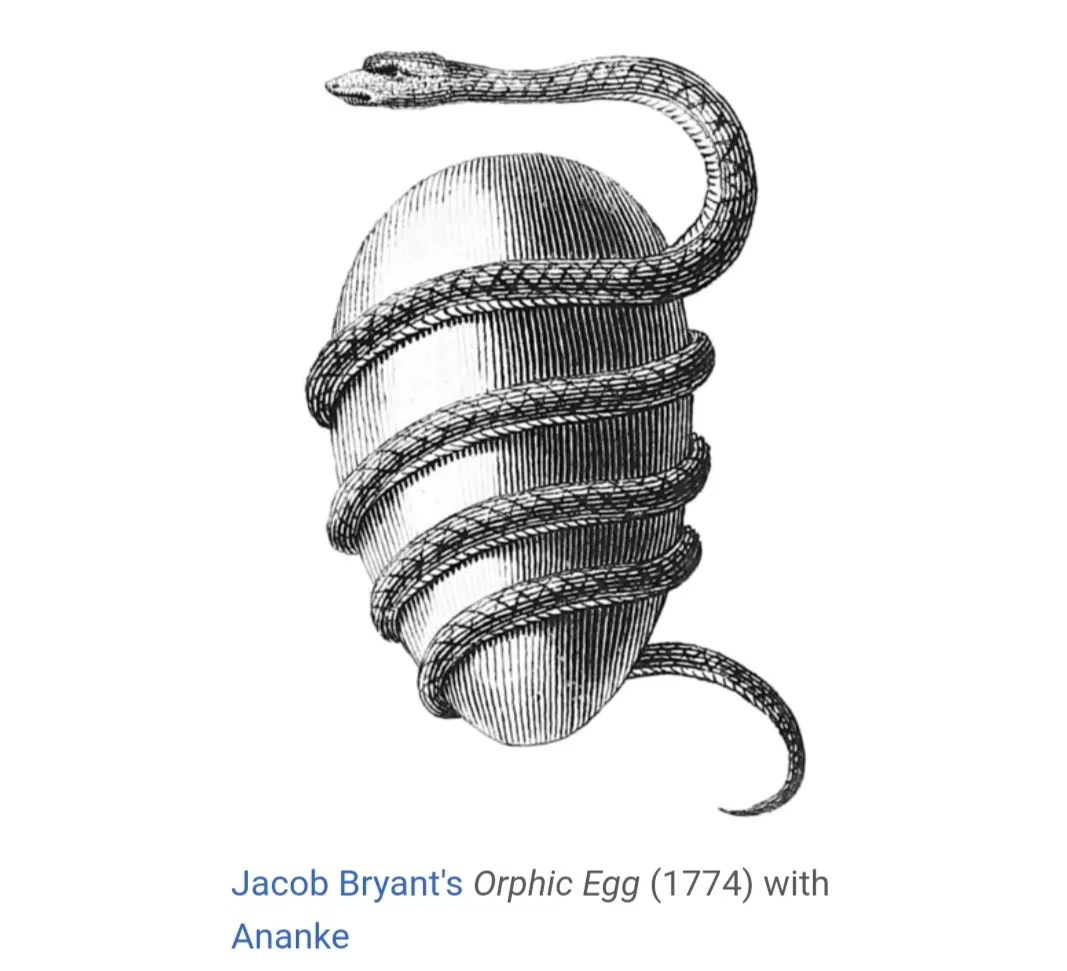
Since I wont go back on same Theme and already reserved myself to Silence, I thought to include some more Symbologies over Orphism, which has its own Theogony and Cosmogony that differs from Hesiod's and Homer's.
This Cosmic Egg represents the Creation, or could we say The Magnus Opus...? A symbol of Generation and out of control from any Human. Who is able to avoid the weather, or the Sun Rising...? Perhaps you just Humble yourself.
There is no Single, Canonical Orphic Theogony text, as the Orphic Myths were transmitted in Fragments and variations over centuries with many adaptations by different authors, texts were likely written and compiled by many contributors, they reflect a distinct worldview with Mystical Knowledge, Purification of the Soul, and a more Transcendental view of the Divine.
In Rhapsodic narrative, Chronos (Unageing Time) mates with Ananke and gives birth to Aether and Chaos, and also the Cosmic Egg. From it emerges Phanes/Protogonos (Eros, meaning Love, and even reffered as Mithras), a Radiant God and Androgynous deity mirroring creation, the first Principle of Life. Phanes becomes the Progenitor of all Gods, including Nox (Night), who also plays a central role on Cosmic Cycles, foretelling Future events and on Divine Order.
Ananke, the Serpent creature, here is said to mean "Necessity, Fate, Inevitability", another weird adjectives are "Compulsion" and "Constraint". Im searching by Wiki page, since its a consensus of many people. Some of these are correlated to the "Opus", but Honestly, looks an Allegory and could mean many things...
Besides, Chronos is mentioned many times in Renaissance Alchemical Books as Saturn, based on previous stuffs... Ananke also appears at "Prometheus Bound" Text, another great work (I don't remember the Snake there lol, time to re-read? Thats a fast one).
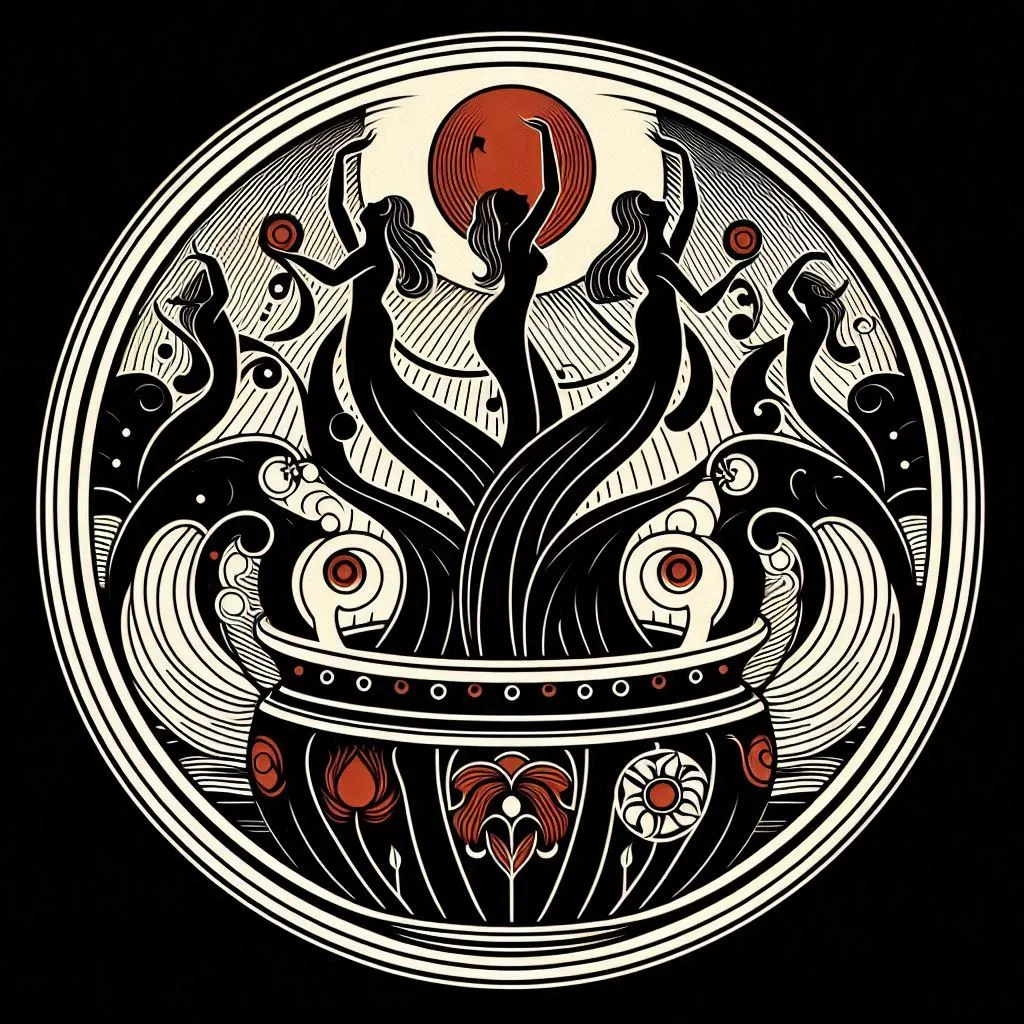
Beyond it, one of the main stories is about Zagreus, Dionysus previous Incarnation and Son of Zeus and, believe or not, Persephone lol, by that some other version tells He is Hades's son, which could make more context sense. Anyway, this angers Hera, the story is very much similar of what we know from Heracles Imo, another of Apollonius's characters, with some differences, here, Zagreus is tricked and shred into pieces, also kinda similar to Osiris and Isis myth, which in contrast, has the heart saved by Athena. When knowing it, Zeus throws thunderbolts at Titans, and somehow from all this karma a sinful mankind was born... Well, well, isn't this the Serpent's true meaning? And Perhaps Adam and Eve Metaphor? Disclosing this takes out all the fun of the search...
Listened the The Orphic Hymns once, but have no idea of whats going on lol, its a poem, kinda tough to remember and interpret. At the end, Apollo gathers its piece to bury at Delphi sacred land. However Athena gives his heart to Zeus, that consums it, and Zagreus is still resurrected (without its remainings? Who knows...?!). Maybe the Thunder God was playing Ma'at's role (symbol of cosmic order) and weighing his son's heart without a balance? Wouldn't be his Themis 2nd Wife Role? No idea again.
But now we got to some interesting part... Delphi is an Amazing Subject, considered Mythologically the Center of World, where also Philosophers used to gather for Speech/Listinings, which sounds like the Chaldean Oracles finality and has some curious tales of its construction, like being a Temple of Gaia initially before a place to worship the Prophecy God (Apollo), the choose of a Pythia sage Oracle... You may find other Shepard in the story, an Intoxicated Sheep, and maybe even another Snake (Python) killed around. Between some more interesting Diverses Books stuffs, not travelling to Saqqara, Parallel Stories and Topics that have no room to be quoted or were deliberately not talked, there is still one Last Brief Piece of Gold-Leaf Orphic Literature that 'll leave to the Philosophers (Lovers of Knowledge, Etymologically) to look for, and maybe passing through a Nymphs's cave... Some main figures were not even part in this article tales, Sigh... Good Luck!!
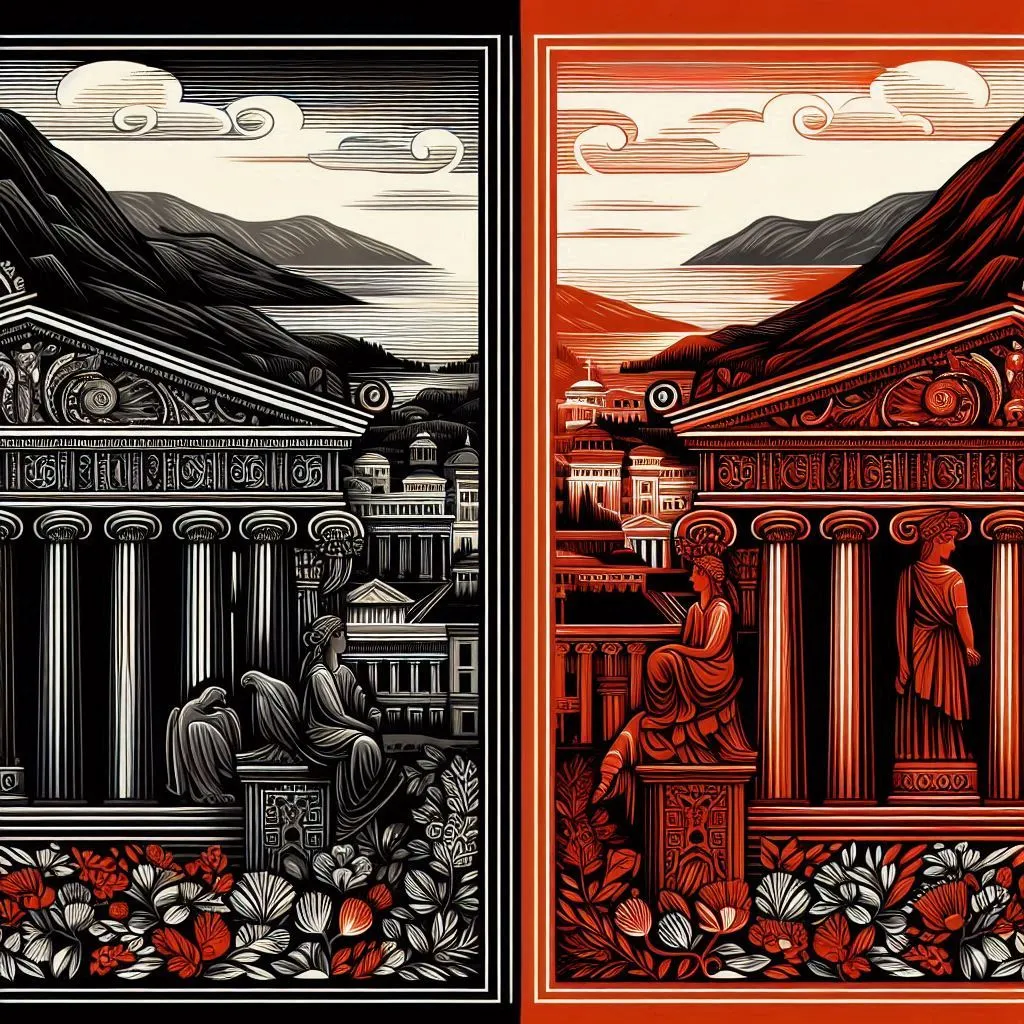
Notes:
#1 A bit tough to link both Myths due transfigurations from one Culture to the other, kinda a few Esoteric stuff on it. So, the Allegorical side take can only be drawn from own interpretation and may not be totally Accurate. (Btw, writing to myself is just a great way to compile info).
#2 Anyone claiming to have an Overknowledge of everything is deceiving itself and others imo, or trying to make it look over exciting / smarter (or its the Messiah lol), since Historians, Archeologists and Epigraphists don't do so. Beyond, true Scholars 'll work to provide info exempt of dogma agenda, own bias or superstition, like even with Dead Sea Scrolls. Said it, you can only find that much info by own interest because would be too much time consuming... An article serves at most for a Taste of Literature.
#1 A bit tough to link both Myths due transfigurations from one Culture to the other, kinda a few Esoteric stuff on it. So, the Allegorical side take can only be drawn from own interpretation and may not be totally Accurate. (Btw, writing to myself is just a great way to compile info).